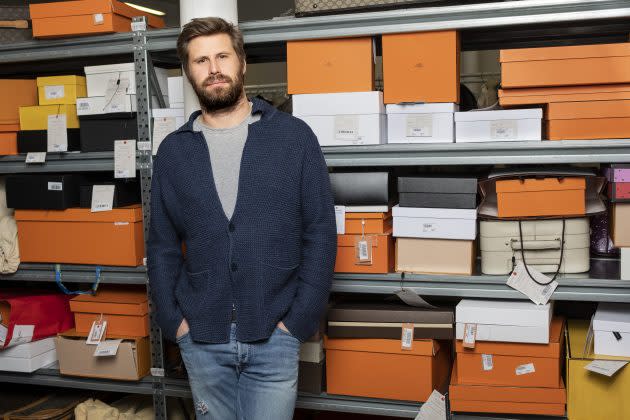Vestiaire Collective Launches Community Equity Fundraising Round

PARIS — Vestiaire Collective is offering customers a new buy-in this season.
The luxury resale platform is launching a community equity fundraising round, partnering with U.K.-based platform Crowdcube.
More from WWD
Chanel and What Goes Around Comes Around Trial Continues in New York Federal Court
Chanel Executive Describes 2012 Factory Theft During Testimony
The company aims to raise a minimum of 1 million euros. Although that amount won’t make much of a financial dent, it is intended to give customers a stake in Vestiaire’s long-term growth.
“We’re getting very close to profitability. We thought it’d be amazing to have this community be part of the business and participate in the success of the business,” chief executive officer Maximilian Bittner told WWD.
The company made all employees shareholders last year. “So for us, this is really a very natural progression to say ‘thank you’ to our community…it’s largely symbolic for those who want to participate.”
Customers will have access to the latest class of preferred shares from the company’s most recent funding round, priced at 1.78 euros per share, with an accessible minimum purchase of 11 euros.
Bittner said the company quietly held an internal fundraising round in November for an additional 25 million euros, led by existing investor Eurazeo, based on a valuation of 1.1 billion euros.
“That round is exponentially smaller than what we raised in 2021, which shows that our approach to profitability is coming very soon. We just don’t need that much more money. The business is becoming more and more self-funding,” he said. The company raised two tranches of 178 million euros each, led by luxury group Kering and Tiger Global Management, in 2021, and was valued at 1.4 billion euros in that round.
Vestiaire is on track to be profitable before the end of the year, Bittner said, and then it will turn its sights toward an IPO.
“We’re still very conservative with regard to our planning for 2024, but despite that conservative planning, we think we will approach the profitability toward the end of this year,” he said.
The platform’s revenue grew 25 percent in 2023 alone, Bittner said, and the company has more than doubled its gross merchandise value and sales In the past three years.
Vestiaire has stayed “extremely resilient” during the post-pandemic luxury boom and its subsequent leveling, said Bittner.
“That community got even stronger over the last five years, with the extreme focus around environmental sustainability topics, which we’ve pushed further and further with,” he said, citing the company’s highly publicized, two-phase fast-fashion ban.
Bittner said the company benefited from the luxury boom, and is in turn continuing to benefit from the luxury downturn. “We’re a platform, so we benefit from all of it. We benefit from those who are doing well and those who are in some sort of way hedged performance-wise,” he said.
While other resale platforms have struggled with stabilizing their supply and demand as shopping habits fluctuate, Vestiaire Collective said it can ride out the softening luxury market by relying on its sophisticated European customer and growing its market share in the U.S.
“The opportunity in the U.S. is so exponentially bigger than any other opportunity out there…[but] there’s a lot of stuff we need to get right in the U.S. We need to get the customer segmentation right, we need to get the messaging toward the U.S. consumers right, and the overall organization,” he said.
Bittner said that due to its focus on luxury, the company has an average basket size of 350 euros and he is looking to bring that down while upping the ready-to-wear and shoes categories.
Vestiaire Collective acquired U.S.-based platform Tradesy in 2022 and merged it into its main brand early last year.

But with players like Poshmark and The RealReal already established, this year Vestiaire Collective will “be playing offense,” he said. “We’re feeling very confident. We’re still careful, we’re still conservative, but we think that ’24 is an amazing opportunity to take market share.”
Much of Bittner’s focus in the U.S. market is increasing the share of rtw and shoes versus high-end handbags and jewelry to entice new customers. “We really believe in these lower price points as the volume-drivers because I think that’s really what gets people to become part of this community,” he said.
Hitting profitability before an IPO would put it a step ahead of The RealReal, which raised $300 million upon its public offering in 2019, while it was still hitting annual losses. It soared above $30 upon offering, but sits at less than $2 today.
Poshmark was valued at $7.5 billion upon its IPO, but its share price fell more than 80 percent before it was acquired by Korean e-commerce company Naver in October 2022. Naver-backed Korelya Capital also invested in Vestiaire Collective in 2020.
Bittner said the community equity fundraise initiative was conceived by the marketing team, along with efforts such as becoming a B Corp, and issuing the company’s impact and trust reports in order to make its message of sustainable reuse of clothing more clear to consumers.
“It’s a nice way to connect with the community,” he said.
Best of WWD
